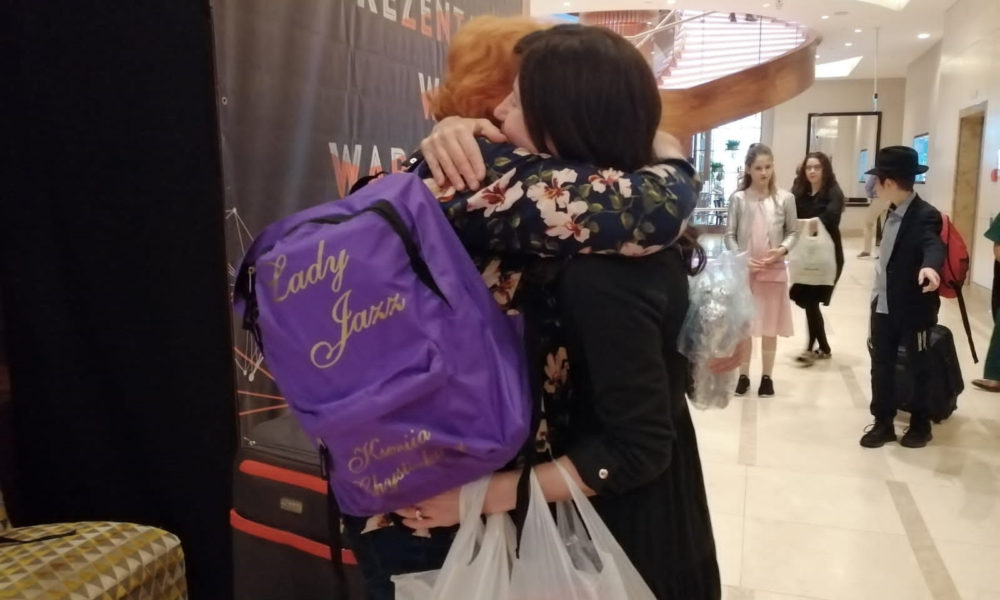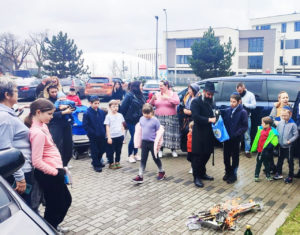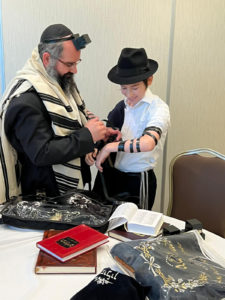Banner
Half a year of war and wandering the world

South African-born Rebbetzin Rochi Levitansky has travelled between seven countries since she fled Ukraine six months ago. Like millions of others, she found herself on a rollercoaster ride as a refugee since Russia invaded Ukraine on 24 February 2022. But this week, her husband and sons made their way back to their hometown of Sumy, where they visited those in their community who stayed behind.
“It’s surreal,” says Levitansky, about her husband, Rabbi Yechiel Levitansky, visiting Ukraine. The couple are Chabad shluchim (emissaries), and are still tending to the needs of those who remained in Sumy. Never did she imagine that the war would still be raging six months later and that she and her children would be scattered around the world with no place to call home.


Rebbetzin Sora Levinson, whose brother, Rabbi Levi Silman lives in Cape Town, also fled the war from Kharkiv, escaping to Moldova and then America. “We left everything. Each child took a small case with some clothes and valuables. Thank G-d there are a lot of kind family, friends, and people we had never met who helped us when we came to New York. My kids still talk about ‘when we go back’. They don’t realise how much damage has been done to the city,” she says. She’s grateful that their home is still standing, but has no idea when she’ll be able to return.
She and her husband, Rabbi Chaim Eli, who are also Chabad shluchim, have tried to put down roots while living life in limbo. They are still tending to the needs of their community, now scattered around the globe.
Vita Pugh-Jones lives in South Africa, but her mother, brother, and relatives are still in Ukraine. “I’m even more worried about what’s going on than I was before because before, it was just a few areas that were affected, but now, it’s everywhere. There’s no safe place in Ukraine,” she says.
“Another thing is the threat of damage to the nuclear power station. It could be another Chernobyl. Speaking to my family, everything is so expensive, and obviously, salaries stay the same or there’s a delay in getting paid as there’s no money in the country. They may have to go through winter without any heating, which is very worrying.”
The head of the Ukrainian Association of South Africa, Dzvinka Kachur, says, “It’s still difficult to believe that something like this is possible – that 376 children have been killed or that 2 000 hospitals have been bombed, or that thousands of civilians have been killed. Six months also brings the realisation that the need for humanitarian aid is growing all the time, but attention to the matter is decreasing.”
She says getting refugee status in South Africa is difficult. Ukrainian refugees have been able to get a visitor’s visa for three months, which can be extended once. So already, some refugees who came in February have had to leave. Others have been able to get a “relatives visa” for two years, “but there is little certainty about who the government will allow to stay”.
She thanked those who have supported Ukraine. “I call on businesses to stop trade or any co-operation with Russia as it supports its killing of civilians and war crimes.”
South African Ronnie Apteker also fled Kyiv with his wife and son in the early days of the war. Six months later, they remain in South Africa. Writing on his blog, Apteker says, “When 9/11 happened America and the rest of the globe was shocked. This tragedy changed everyone’s lives. And now in Ukraine, we’re witnessing terrorism constantly but not much has changed in the world – well, not that I can see.
“Perhaps I’m just cynical but I don’t believe Russia is being punished for what it’s doing. It’s insane and evil, and yet, it keeps doing it, and the world is watching, week after week. If a mall in a G7 country was hit by a missile or if a residential building got destroyed by a rocket, there would be a backlash towards Russia the next day. A total boycott would be the result. But when it’s Ukraine, who cares?”
Levitansky, who is in New York, says she’s blessed to have been able to help other refugees fleeing the war. The highlight of this was running a “refugee hotel” in Warsaw. The project was run by Chabad, which found sponsors to keep it going for many months.
“The refugee hotel was for people who needed to wait before heading to other places, or people who had nowhere else to go,” she says. “Many of our community members came there, which was emotional. We had 150 people for Pesach. Some had never celebrated it before, some never imagined they would be having a seder, and there we were, having Pesach together.”
She says some of the stories she heard from refugees were horrific. “We had a couple from Mariupol. She, her husband, and her elderly parents lived in the basement of their apartment building for 40 days and 40 nights. They ate jars of food. They broke pipes to get water. They slept on chairs. She cried the whole time, as she had lost contact with her daughter and grandchildren.
“Then one day, the building was bombed and went up in flames. They had nowhere to go and moved from town to town. Her elderly father collapsed and died, and they buried him along the way. Though she lost her father, she eventually found her daughter and grandchildren. All they had were the clothes on their backs. It felt like something from 70 years ago, not my modern world. How can that be?”
The refugees wanted for nothing at the hotel. Children were entertained, and people could recuperate after horrific ordeals. The Levitanskys kept Jewish life alive. “On Shavuos, people stayed up all night learning. People really wanted to hold onto their Judaism,” Levitansky says.
Most refugees were Jews, but if non-Jews arrived and had nowhere else to go, space was made for them. Eventually the hotel closed, but “we didn’t leave until everyone had a place to go”, she says. She and her family hope to continue working with refugees, and see their journey as part of Hashem’s plan.
“Ukraine was far from perfect, but it was changing for the better year on year,” writes Apteker. “This nightmare war isn’t something it started, and it did nothing to Russia to deserve such a brutal invasion. Yes, there have been tensions between the two nations for a long time, but Ukraine was getting on with life, making food, writing software, building airplanes, and more. Tourism was on the rise, and life in Ukraine was good.
“Now, innocent people are being brutally killed just about every day, and it seems like it will never end. And yet, the average Russian is carrying on with their lives without a care in the world. Something isn’t right with this scenario. Please G-d, this nightmare war ends soon. If Russia wins this war and destroys Ukraine, then evil and terrorism have prevailed, and it will spread. What kind of a world is this then? Not a world I want to be a part of.”